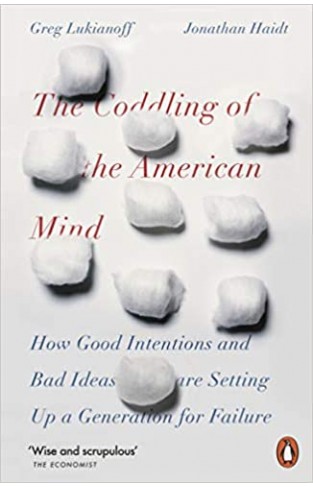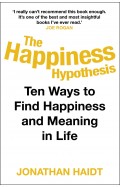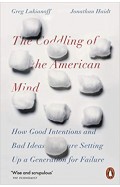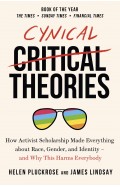- Home
- Non Fiction
- Philosophy
- The Coddling of the American Mind - How Good Intentions and Bad Ideas Are Setting Up a Generation for Failure
The Coddling of the American Mind - How Good Intentions and Bad Ideas Are Setting Up a Generation for Failure
By: Jonathan Haidt
-
Rs 2,515.50
- Rs 2,795.00
- 10%
You save Rs 279.50.
Due to constant currency fluctuation, prices are subject to change with or without notice.
Financial Times, TLS, Evening Standard, New Statesman Books of the Year
'Excellent, their advice is sound . . . liberal parents, in particular, should read it' Financial Times
Have good intentions, over-parenting and the decline in unsupervised play led to the emergence of modern identity politics and hypersensitivity?
In this book, free speech campaigner Greg Lukianoff and social psychologist Jonathan Haidt investigate a new cultural phenomenon of "safetyism", beginning on American college campuses in 2014 and spreading throughout academic institutions in the English-speaking world.
Looking at the consequences of paranoid parenting, the increase in anxiety and depression amongst students and the rise of new ideas about justice, Lukianoff and Haidt argue that well-intended but misguided attempts to protect young people are damaging their development and mental health, the functioning of educational systems and even democracy itself.
Financial Times, TLS, Evening Standard, New Statesman Books of the Year
'Excellent, their advice is sound . . . liberal parents, in particular, should read it' Financial Times
Have good intentions, over-parenting and the decline in unsupervised play led to the emergence of modern identity politics and hypersensitivity?
In this book, free speech campaigner Greg Lukianoff and social psychologist Jonathan Haidt investigate a new cultural phenomenon of "safetyism", beginning on American college campuses in 2014 and spreading throughout academic institutions in the English-speaking world.
Looking at the consequences of paranoid parenting, the increase in anxiety and depression amongst students and the rise of new ideas about justice, Lukianoff and Haidt argue that well-intended but misguided attempts to protect young people are damaging their development and mental health, the functioning of educational systems and even democracy itself.
The Righteous Mind: Why Good People are Divided by Politics and Religion
By: Jonathan Haidt
Rs 2,636.00 Rs 3,295.00 Ex Tax :Rs 2,636.00
The Happiness Hypothesis - Putting Ancient Wisdom to the Test of Modern Science
By: Jonathan Haidt
Rs 2,515.50 Rs 2,795.00 Ex Tax :Rs 2,515.50
The Coddling of the American Mind - How Good Intentions and Bad Ideas Are Setting Up a Generation for Failure
By: Jonathan Haidt
Rs 2,515.50 Rs 2,795.00 Ex Tax :Rs 2,515.50
The Anxious Generation - How the Great Rewiring of Childhood Is Causing an Epidemic of Mental Illness
By: Jonathan Haidt
Rs 5,665.50 Rs 6,295.00 Ex Tax :Rs 5,665.50
Zubin Mehta: A Musical Journey (An Authorized Biography)
By: VOID - Bakhtiar K. Dadabhoy
Rs 892.50 Rs 1,050.00 Ex Tax :Rs 892.50
Meditations (Penguin Pocket Hardbacks)
By: Marcus Aurelius
Rs 3,145.50 Rs 3,495.00 Ex Tax :Rs 3,145.50
Cynical Theories: How Activist Scholarship Made Everything about Race, Gender, and Identity - And Why this Harms Everybody
By: Helen Pluckrose
Rs 2,545.75 Rs 2,995.00 Ex Tax :Rs 2,545.75
The Courage To Be Disliked: How to free yourself, change your life and achieve real happiness
By: Ichiro Kishimi
Rs 2,236.00 Rs 2,795.00 Ex Tax :Rs 2,236.00
The Quest For Meaning: Developing A Philosophy Of Pluralism
By: Tariq Ramadan
Rs 1,185.75 Rs 1,395.00 Ex Tax :Rs 1,185.75
The Basic Writings of Nietzsche
By: Peter Gay/Sigmund Freud
Rs 3,865.50 Rs 4,295.00 Ex Tax :Rs 3,865.50
Meditations (Penguin Pocket Hardbacks)
By: Marcus Aurelius
Rs 3,145.50 Rs 3,495.00 Ex Tax :Rs 3,145.50
Cynical Theories: How Activist Scholarship Made Everything about Race, Gender, and Identity - And Why this Harms Everybody
By: Helen Pluckrose
Rs 2,545.75 Rs 2,995.00 Ex Tax :Rs 2,545.75
The Courage To Be Disliked: How to free yourself, change your life and achieve real happiness
By: Ichiro Kishimi
Rs 2,236.00 Rs 2,795.00 Ex Tax :Rs 2,236.00
No recently viewed books available at the moment.
Zubin Mehta: A Musical Journey (An Authorized Biography)
By: VOID - Bakhtiar K. Dadabhoy
Rs 892.50 Rs 1,050.00 Ex Tax :Rs 892.50
The Righteous Mind: Why Good People are Divided by Politics and Religion
By: Jonathan Haidt
Rs 2,636.00 Rs 3,295.00 Ex Tax :Rs 2,636.00
The Happiness Hypothesis - Putting Ancient Wisdom to the Test of Modern Science
By: Jonathan Haidt
Rs 2,515.50 Rs 2,795.00 Ex Tax :Rs 2,515.50
The Coddling of the American Mind - How Good Intentions and Bad Ideas Are Setting Up a Generation for Failure
By: Jonathan Haidt
Rs 2,515.50 Rs 2,795.00 Ex Tax :Rs 2,515.50
The Anxious Generation - How the Great Rewiring of Childhood Is Causing an Epidemic of Mental Illness
By: Jonathan Haidt
Rs 5,665.50 Rs 6,295.00 Ex Tax :Rs 5,665.50
Meditations (Penguin Pocket Hardbacks)
By: Marcus Aurelius
Rs 3,145.50 Rs 3,495.00 Ex Tax :Rs 3,145.50
Cynical Theories: How Activist Scholarship Made Everything about Race, Gender, and Identity - And Why this Harms Everybody
By: Helen Pluckrose
Rs 2,545.75 Rs 2,995.00 Ex Tax :Rs 2,545.75
The Courage To Be Disliked: How to free yourself, change your life and achieve real happiness
By: Ichiro Kishimi
Rs 2,236.00 Rs 2,795.00 Ex Tax :Rs 2,236.00


















-120x187.jpg?q6)

















